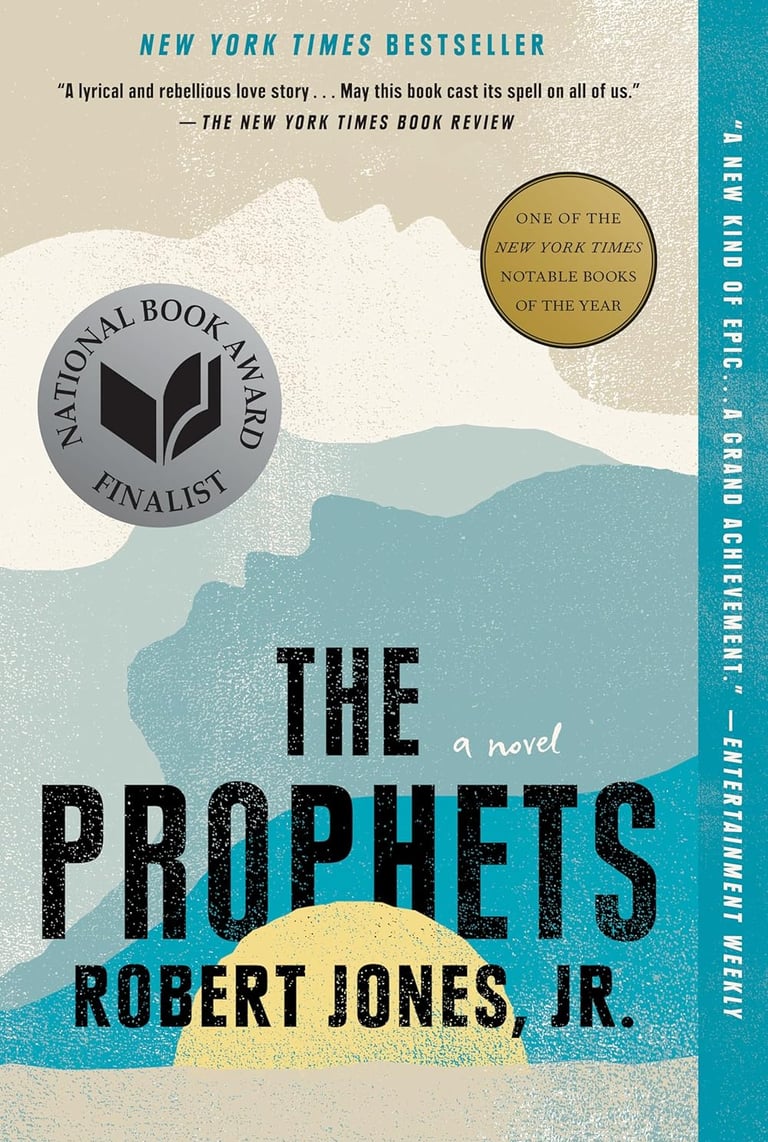Sacred Inheritance: A Journey Through The Prophets by Robert Jones Jr.
Robert Jones Jr.'s 'The Prophets' illuminates a forbidden love that becomes an act of resistance and spiritual truth. This profound debut novel recovers silenced histories and celebrates the enduring power of love to create spaces of freedom even in the most oppressive circumstances.
6/14/20254 min read
> Disclosure: This post contains affiliate links. As an Amazon Associate, Elevated Echo may earn a small commission from qualifying purchases made through these links—at no extra cost to you. This helps support our mission to share soulful stories and reflections.
In a literary landscape increasingly attuned to reclaiming silenced histories and illuminating forgotten narratives, Robert Jones Jr.'s debut novel, [The Prophets], emerges as a work of extraordinary vision and power. Set on a plantation called Empty in antebellum Mississippi, the novel centers on the forbidden love between two enslaved men, Isaiah and Samuel, whose bond becomes both their sanctuary and the target of mounting hostility.
As we explore themes of legacy and reflection this week at Elevated Echo, Jones’s novel offers a profound meditation on the inheritance of love, resistance, and spiritual truth that transcends generations.
A Love That Defies Erasure
What first strikes the reader about The Prophets is its unflinching commitment to restoring what history has systematically erased: the full humanity, emotional depth, and spiritual lives of enslaved Black people particularly those whose queerness placed them at a complex intersection of vulnerability and strength.
Isaiah and Samuel's love exists as an act of creation amid destruction a private Eden within the brutal confines of the cotton barn where they work. Jones writes their intimacy with a lyricism that elevates their bond into the sacred:
> “Samuel was the only person who had ever made Isaiah feel as if he were more than just another piece of property… When they were together, they were not just flesh. They were breath and air and all the things that are never owned.”
In a system designed to commodify every aspect of human existence, their love becomes the one thing they refuse to surrender. It is not merely defiance it is divine.
The Chorus of Ancestors
Perhaps the most daring aspect of The Prophets is its incorporation of interludes that transport readers to pre-colonial Africa. In these sections, we encounter a community where same-sex love is not only accepted but revered as a sacred gift. These passages function like an ancestral chorus, connecting Isaiah and Samuel’s love to a lineage of Black queer existence that predates slavery and colonization.
This narrative structure refutes the myth that queerness is foreign to African cultures a “white man’s disease,” as one character puts it. Instead, Jones offers a reclamation:
> “We were once a people who honored the in-between… Those who lived in the in-between, who were blessed to love both man and woman, or whose bodies encompassed both male and female, were revered. They were the seers, the ones who could interpret the whispers of the ancestors.”
Through these ancestral voices, The Prophets becomes more than a historical novel—it is a living bridge, stitching together past and future with radical remembrance.
The Politics of Faith and Resistance
At the heart of Jones’s exploration of legacy is a nuanced look at religion’s double edge—how Christianity was used to both enslave and empower. The character Amos, who begins preaching on behalf of the plantation owners, turns against Isaiah and Samuel, weaponizing scripture to condemn them. Yet Jones refuses to paint Amos simply as a villain. His betrayal stems from fear and internalized trauma, revealing how systems of domination corrupt even our most intimate bonds.
In quiet contrast, women like Maggie and Essie maintain spiritual practices rooted in ancestral knowledge rituals, storytelling, and healing passed down in secret. Their faith does not require a pulpit but pulses through everyday resistance. They offer a different inheritance: one of embodied wisdom and resilience.
Language as Legacy
Jones’s language itself is a radical inheritance. His prose draws from Black vernacular, biblical cadence, and West African oral tradition, creating a voice that is both ancient and innovative. His sentences are rhythmic, musical, and demand to be read aloud:
> “Empty was its name. A joke that no one got because humor had long since dried up and blown away… The land had been something else before… But that something else was stolen by thieves who were so good at thieving that they convinced themselves that it was not stealing at all but claiming.”
Here, language is not merely a vehicle for storytelling it is a spiritual offering, a preservation of memory, and an act of liberation.
The Inheritance of Trauma and Resilience
While Jones does not flinch from the horrors of slavery, what resonates most is his portrayal of resilience—not as romanticized endurance, but as a complex inheritance of both pain and wisdom.
Moments of joy and connection shine through the darkness: in shared stories, in memory, in dreams. Jones allows his characters to be more than their suffering. He shows how even within the most brutal systems, people preserved their sense of self, their love, and their will to resist.
A Contemporary Resonance
Though set in the 1800s, The Prophets speaks urgently to today. It interrogates whose stories are preserved, whose love is celebrated, and how religion can still be used as a weapon against marginalized people. It also models solidarity—between women, between queer people, between the living and the ancestral.
As Father’s Day approaches, a time when we reflect on legacy, The Prophets reminds us that honoring our ancestors requires more than sorrow. It calls for celebrating their joy, their resistance, and their capacity for love.
Final Reflections
The Prophets is not an easy read, but it is a necessary one. With literary precision and spiritual depth, Robert Jones Jr. has created a masterpiece that transcends genre. This novel is historical recovery, spiritual testimony, and literary innovation all at once.
For readers interested in stories that confront the painful complexities of American history while offering a vision of radical love and spiritual continuity, [The Prophets] is a must-read.
Through Isaiah and Samuel’s love a love that blossoms in spite of everything—we receive a sacred inheritance: a reminder that love, especially when it refuses to be erased, is the most enduring form of resistance.
> Want to read this transformative novel? Click here to get your copy of [The Prophets]
Hear more Echos
Credit & copywrites
Hosted by: Hostinger
Designed by: E-Zay designs
© 2024 Elevated Echo, All rights reserved.
contact


